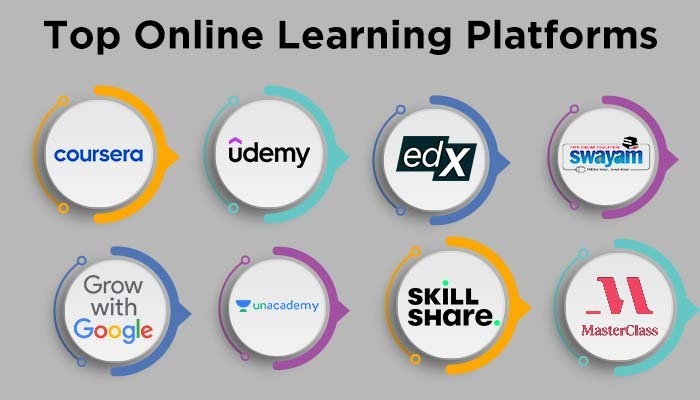Online education has transformed how we learn. Whether you want to develop a new skill, change careers, or simply expand your knowledge, online platforms offer endless opportunities. Regardless of your level—beginner, intermediate, or advanced—there’s a platform for you. Here are the top 10 online learning platforms that cater to all skill levels:
- Coursera
Coursera collaborates with top universities and organizations to offer courses, certifications, and even degrees. It covers a range of subjects from technology to the humanities, designed for learners at all levels.
Features: University-level courses, specializations, and professional certificates. Flexible deadlines and peer-graded assignments.
Pros: Access to free content, affordable certifications, and partnerships with prestigious universities like Stanford and Yale.
Cons: Certification often requires payment, and advanced degrees can be expensive. - Udemy
Udemy offers a vast range of over 155,000 courses, from coding and web design to photography and meditation. It’s known for its affordability and frequent discounts.
Features: Self-paced learning, lifetime access to purchased courses, and multi-language options.
Pros: Low-cost courses and a wide range of topics.
Cons: Quality can vary because the content is user-generated. - LinkedIn Learning
Once known as Lynda.com, LinkedIn Learning is ideal for professionals wanting to upgrade their skills. It provides courses in business, tech, and creative fields, with the option to showcase completions on your LinkedIn profile.
Features: Integration with LinkedIn, personalized recommendations based on your profile.
Pros: Career-focused content, seamless LinkedIn integration.
Cons: Subscription-based, with no lifetime access to completed courses. - edX
Founded by Harvard and MIT, edX offers university-level courses from around the world. It’s a great option for those interested in professional development or pursuing online degrees.
Features: MicroMasters, degrees, and professional certificates. Free auditing is available.
Pros: High-quality education from top universities, well-respected certificates.
Cons: Full access to course materials usually requires payment. - Skillshare
Skillshare is ideal for those interested in creative fields, offering classes in design, photography, and more. It’s hands-on, encouraging project-based learning.
Features: Focus on creativity and practical skills, with many courses involving student projects.
Pros: Affordable subscription, perfect for creatives.
Cons: Courses may not be as comprehensive as academic platforms. - Khan Academy
Khan Academy is a nonprofit that provides free educational resources for all ages, particularly in foundational subjects like math, science, and economics.
Features: Free access, no ads, and personalized learning dashboards.
Pros: High-quality content for free.
Cons: Limited options for advanced learners. - Pluralsight
Pluralsight specializes in tech-related fields like IT, software development, and technology. It includes skill assessments to guide learning.
Features: Skill assessments and learning paths tailored to your needs.
Pros: Ideal for tech professionals, practical, hands-on learning.
Cons: Subscription-based with limited free access beyond trial periods. - MasterClass
MasterClass offers courses taught by famous professionals, from cooking lessons with Gordon Ramsay to writing with Margaret Atwood. It’s ideal for those who want to learn from top industry leaders.
Features: High-quality production, courses led by experts.
Pros: Unique access to top professionals, engaging video content.
Cons: Fewer courses, focused more on insights than hands-on skills. - FutureLearn
FutureLearn collaborates with universities and organizations to offer courses with a focus on social learning. Peer discussions and interactions are emphasized.
Features: Options ranging from short courses to full online degrees.
Pros: Social learning environment, free access to many courses.
Cons: Fewer subjects than some larger platforms. - Treehouse
Treehouse is ideal for beginners looking to enter web development. It offers coding, web development, and app design courses with a focus on real-world skills.
Features: Step-by-step projects and learning paths for specific tech careers.
Pros: Great for tech beginners, project-based learning reinforces skills.
Cons: Limited to tech fields, subscription-based.
Choosing the Right Platform
The best platform depends on your learning goals. If you need professional certifications or university credits, Coursera, edX, and LinkedIn Learning are great options. For creative skills, Skillshare and MasterClass are ideal, while those seeking tech knowledge might benefit from Pluralsight or Treehouse.
Benefits of Online Learning
- Flexibility: Learn at your own pace, anytime, anywhere.
- Diverse Topics: Courses range from coding to cooking.
- Expert Instruction: Many platforms feature courses from industry leaders.
- Affordability: Many offer free or affordable content.
Challenges of Online Learning
- Self-Motivation: Staying disciplined without a set schedule can be challenging.
- Lack of Interaction: Online courses often lack face-to-face engagement, which can affect motivation.
- Varying Quality: Not all platforms offer equally vetted content.
Conclusion
Whether you want to boost your career, explore a new hobby, or learn something completely new, these top 10 online learning platforms offer something for every skill level. From Coursera’s academic depth to Master Class’s celebrity-driven approach, the possibilities are endless. Start learning and unlock your potential today!





